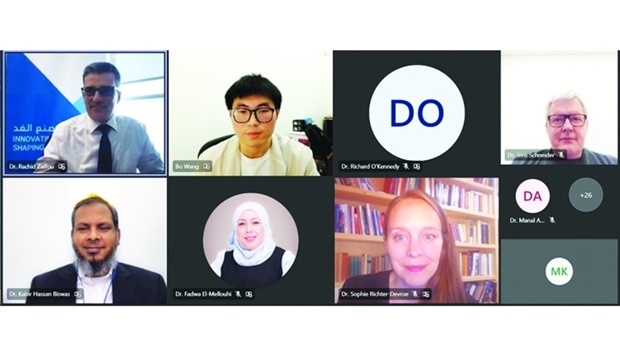The Office of the Vice President for Research (OVPR) at Hamad Bin Khalifa University (HBKU) held the second event in its 'Thematic Research Highlights Series' on June 9 to showcase four active projects. The series demonstrates the university’s commitment to interdisciplinary and cross-collaborative research aligned with HBKU’s strategic research areas and with Qatar Foundation’s overall goals and objectives.
After opening remarks by Dr Richard O’Kennedy, vice president for research at HBKU, and Dr Rachid Zaffou, senior planning and research director, the Lead Project Investigators presented their research projects.
Awarded under the OVPR’s Thematic Research Grant Programme, the projects showcase how HBKU’s research strengths in machine learning, artificial intelligence, digital humanities, and biomedicine are being further developed to address needs and to create opportunities for social and economic impact both locally and globally.
Dr Sophie Richter-Devroe, associate professor at the College of Humanities and Social Sciences, presented a project titled 'Forced Migration, Digital Technology and Health', with collaborators at Qatar Computing Research Institute.
The interdisciplinary study of Syrian refugees in Italy and Greece examines the crucial, but often neglected, links between health and digital technology in the context of forced migration and displacement.
Dr Jens Schneider, assistant professor, College of Science and Engineering ( CSE), is conducting research towards 'A Multimedia Education Tool for Qatar’s History'.
This unique, interactive educational software will be used to provide school students with an immersive tool to explore Qatar’s history.
Showcasing how collaboration leverages existing resources to drive research productivity and accelerate innovation, Dr Fadwa El Mellouhi, senior scientist, Qatar Environment and Energy Research Institute (Qeeri), presented 'An Artificial Intelligence Platform for Accelerating Materials Discovery'.
The project brings together Qeeri’s Accelerated Materials Discovery capabilities, CSE’s AI expertise, and HBKU IT’s cloud hosting infrastructure. The AI platform will mature machine-learning decision-making and enable automated and robotics-assisted materials synthesis adaptable to Qatar’s evolving economy.
Dr Bo Wang, assistant professor, CSE, is collaborating with CHLS’s Dr Kabir Biswas to develop 'A Miniaturised High-Dynamic-Range Bioluminescence and Fluorescence Biosensing System for Biomedical Applications'.
The sensing system could be applied for various types of bioassays currently used in clinical settings including antibody-based biomolecule quantification.
Speaking after the event, Dr Richter-Devroe, said: “The Thematic Research Highlights Series illustrates the exemplary ways in which our talented faculty and scientists are advancing priority research areas across different disciplines. It was an opportunity to learn more about innovative projects happening in different colleges, departments and institutes at HBKU.”
After opening remarks by Dr Richard O’Kennedy, vice president for research at HBKU, and Dr Rachid Zaffou, senior planning and research director, the Lead Project Investigators presented their research projects.
Awarded under the OVPR’s Thematic Research Grant Programme, the projects showcase how HBKU’s research strengths in machine learning, artificial intelligence, digital humanities, and biomedicine are being further developed to address needs and to create opportunities for social and economic impact both locally and globally.
Dr Sophie Richter-Devroe, associate professor at the College of Humanities and Social Sciences, presented a project titled 'Forced Migration, Digital Technology and Health', with collaborators at Qatar Computing Research Institute.
The interdisciplinary study of Syrian refugees in Italy and Greece examines the crucial, but often neglected, links between health and digital technology in the context of forced migration and displacement.
Dr Jens Schneider, assistant professor, College of Science and Engineering ( CSE), is conducting research towards 'A Multimedia Education Tool for Qatar’s History'.
This unique, interactive educational software will be used to provide school students with an immersive tool to explore Qatar’s history.
Showcasing how collaboration leverages existing resources to drive research productivity and accelerate innovation, Dr Fadwa El Mellouhi, senior scientist, Qatar Environment and Energy Research Institute (Qeeri), presented 'An Artificial Intelligence Platform for Accelerating Materials Discovery'.
The project brings together Qeeri’s Accelerated Materials Discovery capabilities, CSE’s AI expertise, and HBKU IT’s cloud hosting infrastructure. The AI platform will mature machine-learning decision-making and enable automated and robotics-assisted materials synthesis adaptable to Qatar’s evolving economy.
Dr Bo Wang, assistant professor, CSE, is collaborating with CHLS’s Dr Kabir Biswas to develop 'A Miniaturised High-Dynamic-Range Bioluminescence and Fluorescence Biosensing System for Biomedical Applications'.
The sensing system could be applied for various types of bioassays currently used in clinical settings including antibody-based biomolecule quantification.
Speaking after the event, Dr Richter-Devroe, said: “The Thematic Research Highlights Series illustrates the exemplary ways in which our talented faculty and scientists are advancing priority research areas across different disciplines. It was an opportunity to learn more about innovative projects happening in different colleges, departments and institutes at HBKU.”

